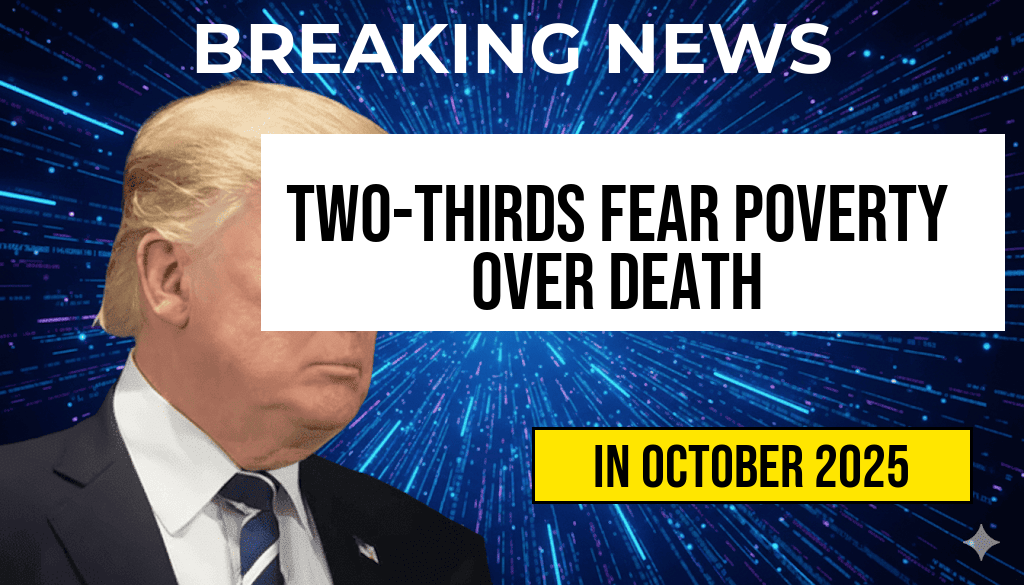A recent survey has revealed a startling perspective among the American populace: nearly two-thirds of respondents expressed a greater fear of financial insecurity than the prospect of death itself. This finding sheds light on the escalating anxiety surrounding personal finances, particularly in a time marked by economic uncertainty, inflationary pressures, and rising living costs. Conducted by a leading financial advisory firm, the survey highlights that 64% of participants prioritize the worry of running out of money over their fear of mortality. This sentiment is particularly pronounced among younger demographics, with significant implications for mental health and societal attitudes toward wealth and security.
Financial Anxiety on the Rise
The survey, which included responses from over 1,000 adults across the United States, indicates a pervasive trend that permeates various age groups, though younger individuals (ages 18-34) report the highest levels of financial fear. As the cost of living increases and wages stagnate, many are grappling with the harsh realities of managing personal finances.
Key Findings from the Survey
- 64% of Americans fear running out of money more than death.
- Young adults are particularly affected, with 75% of respondents aged 18-34 citing financial insecurity as their primary concern.
- Only 36% of participants expressed a greater fear of death than financial instability.
Factors Contributing to Financial Fear
Several factors contribute to this growing fear of financial instability. Economic conditions, including inflation and fluctuating job markets, have heightened awareness regarding financial planning. Additionally, the rise of social media often paints an unrealistic picture of wealth and success, exacerbating feelings of inadequacy among individuals struggling to make ends meet.
Inflation and Living Costs
In recent years, inflation has surged, with prices for essential goods and services climbing steadily. According to the U.S. Bureau of Labor Statistics, the Consumer Price Index (CPI) has seen significant increases, impacting everything from groceries to housing. This economic pressure forces individuals to reassess their financial strategies, contributing to heightened anxiety.
The Impact of Student Debt
Another major contributor to financial fear is the burden of student debt. With the average student loan debt exceeding $30,000, many young adults find it challenging to achieve financial independence. This debt often delays significant life milestones such as homeownership, marriage, and savings for retirement.
The Mental Health Connection
The intersection of financial stress and mental health is increasingly acknowledged by experts. Financial insecurity can lead to anxiety, depression, and other mental health issues. A report from the American Psychological Association highlights that individuals experiencing financial stress are more likely to report poor mental health outcomes.
Strategies for Coping with Financial Fear
To combat these fears, financial advisors recommend several strategies:
- Establishing a budget to track income and expenses.
- Building an emergency fund to cover unexpected expenses.
- Seeking professional financial advice to create a personalized financial plan.
Looking Ahead: Financial Literacy and Education
As the fear of financial instability continues to loom large, the need for improved financial literacy becomes more evident. Educational initiatives aimed at teaching budgeting, saving, and investing skills are crucial to empowering individuals to take control of their financial futures. Schools, community organizations, and financial institutions are beginning to recognize the importance of these programs.
Conclusion
The survey’s findings underscore a significant shift in societal priorities, with a clear need for enhanced support systems to address financial anxiety. As Americans navigate these challenging economic waters, fostering a culture of financial literacy and resilience will be essential for alleviating fears and promoting well-being.
Frequently Asked Questions
What does the article reveal about Americans’ fears regarding money?
The article highlights that two-thirds of Americans express a greater fear of running out of money than of death. This statistic underscores the significant anxiety surrounding financial security among the population.
Why are many Americans more afraid of running out of money?
Many Americans fear running out of money due to concerns about their financial stability, especially in retirement. The possibility of not being able to afford basic living expenses can create overwhelming anxiety.
What demographic factors contribute to this fear?
The article suggests that factors such as age, income level, and employment status significantly influence the fear of financial insecurity. Younger individuals may feel less prepared, while older adults worry about their retirement savings.
How does this fear impact Americans’ mental health?
The fear of financial insecurity can lead to increased stress and anxiety, negatively affecting mental health. Individuals may experience heightened worry, which can impact their overall quality of life.
What solutions are suggested for overcoming the fear of running out of money?
The article suggests that individuals can address their fear by improving their financial literacy, creating a realistic budeget, and seeking professional financial advice to enhance their long-term financial planning.











